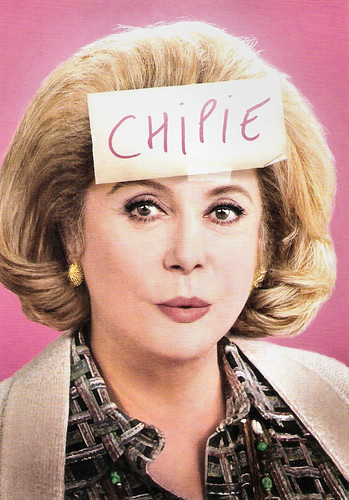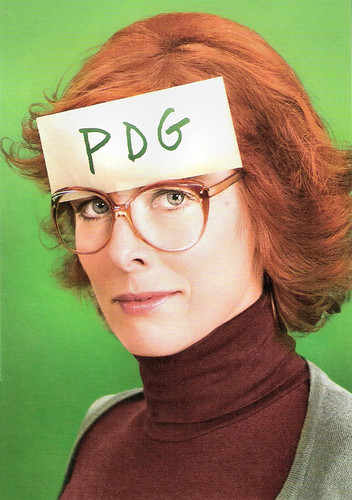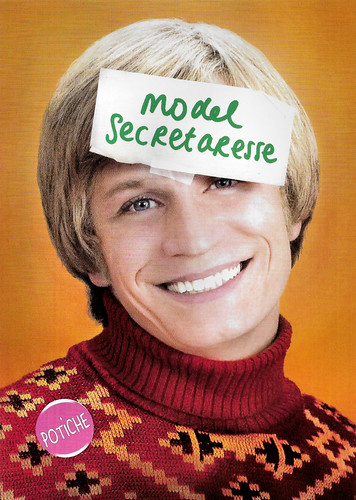
Belgian Freecard by Boomerang. Photo: Mandarin Cinema. Catherine Deneuve in Potiche/Trophy Wife (François Ozon, 2010). Caption: Chipie.

Belgian Freecard by Boomerang. Photo: Mandarin Cinema. Gérard Depardieu in Potiche/Trophy Wife (François Ozon, 2010). Caption: Mother's child.
A biographical film about Nicolas Sarkozy
'Potiche' is the French word for 'ornamental vase', but also for 'showpiece' and 'trophy wife'. Set in 1977, Potiche is situated in the northern French town of Sainte-Gudule, close to Saint-Amand-les-Eaux. There live wealthy industrialist Robert Pujol (Fabrice Luchini) and his wife Suzanne Pujol (Catherine Deneuve), a grandmother who has been a housewife for 30 years.
Suzanne's father was the founder of a successful umbrella company, which was later taken over by her reactionary and misogynist husband. Suzanne, nicknamed "la potiche" by her daughter (Juliette Godreche), puts up with her husband's bad temper, vexations and infidelities without batting an eyelid, not least his relationship with his secretary, Nadège (Karin Viard).
Robert tyrannises his factory workers and they decide to go on strike for better working conditions and kidnap him. When Robert also suffers a heart attack due to all the stress, all hell breaks loose. Suzanne is forced to take over her husband's work with the help of her ex-lover and current union leader and village mayor Maurice (Gérard Depardieu). To everyone's surprise, Suzanne emerges as a real businesswoman who knows how to handle everything. But then Robert returns from holiday fully recovered and things get really complicated.
François Ozon saw the play 'Potiche' by Pierre Barillet and Jean-Pierre Grédy about ten years before he made the film. The political career of Suzanne was entirely Ozon's addition to the story, which in its original incarnation ended when Robert returned to the factory. According to Ozon, the genesis of the film version was, partly, that he had been approached by the producers Éric and Nicolas Altmayer and asked to make a biographical film about Nicolas Sarkozy, and, partly, his experiences from the 2007 presidential campaign, where he followed the Socialist Party's candidate Ségolène Royal.
While writing the screenplay, Ozon regularly met with Barillet, who gladly approved the tweaks made to enhance the story's relevance for contemporary society. The 1970s setting was, however, retained; this was both because the distance allowed the director to make a more humorous film, and because France was more politically divided in the 1970s, which made the class relations more remarkable.

Belgian Freecard by Boomerang. Photo: Mandarin Cinema. Fabrice Luchini in Potiche/Trophy Wife (François Ozon, 2010). Caption: Housewife.

Belgian Freecard by Boomerang. Photo: Mandarin Cinema / Cinéart. Karin Viard in Potiche/Trophy Wife (François Ozon, 2010). Caption: PDG (CEO).
A sweet comedy, knowing about human nature
Potiche was produced by Mandarin Cinéma, with co-production support from Production Services Belgium. The film was deliberately given a theatrical look to create distance and give the audience a constant awareness of watching a work of fiction. An important influence on the visual style was the cinema of Jacques Demy.
The soundtrack includes Michèle Torr with 'Emmène-moi danser ce soir', 'Il était une fois', 'Viens faire un tour sous la pluie' and Jean Ferrat's 'C'est beau la vie'. The film competed at the 67th Venice International Film Festival and received two Magritte Award nominations, winning Best Supporting Actor for Jérémie Renier, who plays Suzanne's son.
The film was fairly well received by critics and the French public. Roger Ebert liked the film: "Potiche is a whimsical comedy, based on a popular Parisian stage success of some years ago. It plays like one, although Ozon uses more locations than a play would find possible. There's little effort at psychological depth, and the characters float along on the requirements of comedy. But it's sweet comedy, knowing about human nature, and Deneuve and Depardieu, who bring so much history to the screen, seem to create it by their very natures."
At AllMovie, Mark Deming agrees: "François Ozon's handling of this material is inspired. While the political and feminist underpinnings of this story are treated with all the seriousness they deserve, Potiche is first and foremost entertainment, and Ozon keeps the story moving at a brisk pace, gives it a glossy visual style that honors the era in which the story takes place without turning it tacky or silly, and reminds us that a good farce needs to communicate to the heart and mind as well as the funny bone. If Potiche works as a feminist document, it's because Ozon's story (he wrote the screenplay, adapted from a play by Pierre Barillet and Jean-Pierre Grédy) shows how a woman can discover her strengths under unlikely circumstances, and here Suzanne's wisdom is never questioned -- the surprise is how she's finally permitted to do something worthwhile with it."
Over two million tickets were sold for Potiche in France. The budget of the film was ca. 13 million dollars and the international revenues were nearly 29 million dollars.

Dutch Freecard by Boomerang, no. P 25-10. Photo: Cinéart / Senz. Karin Viard in Potiche/Trophy Wife (François Ozon, 2010). Caption: CEO.

Dutch Freecard by Boomerang, no. P25-10. Photo: Cineart / Senz. Jérémie Renier in Potiche/Trophy Wife (François Ozon, 2010). Caption: Model secretary.
Sources: Roger Ebert (RogerEbert.com), Mark Deming (AllMovie), Wikipedia (Dutch, English and French) and IMDb.
No comments:
Post a Comment